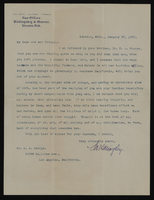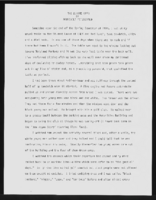Search the Special Collections and Archives Portal
Search Results
Nye County, Nevada Photograph Collection
Identifier
Abstract
The Nye County, Nevada Photograph Collection contains photographs from Nye County, Nevada from 1880 to 1990. The collection includes a wide variety of photographs that document the activities, landmarks, geographical features, towns, ranches, and families of Nye County. The collection covers the areas of Amargosa Valley, Ash Meadows, Beatty, Duckwater, Gabbs, Goldfield, Kawich Mountains, Manhattan, Pahrump, Round Mountain, Rhyolite, Smoky Valley, Springdale, Tecopa, Tonopah, and Twin Springs. The activities documented include mining, prospecting, herding animals, schooling, ranching, building construction, railroad construction, and hunting and fishing.
Archival Collection
George Kelly Ryan Photograph Collection
Identifier
Abstract
The George Kelly Ryan Photograph Collection (1929) depicts waterways in Southern Nevada and Northern Arizona. The collection consists of eight photographic prints and two photographic negatives depicting Saint Thomas, Black Canyon, Boulder Canyon, and the Colorado River.
Archival Collection
Southern Nevada Chapter of the American War Mothers Organization Records
Identifier
Abstract
The Southern Nevada Chapter of the American War Mothers Organization Records (1947-1995) are comprised primarily of scrapbooks containing correspondence and minutes, numerous newspaper clippings, and photographs. Also included are pamphlets on American War Mothers organizational rituals, bylaws, history, ceremonial ephemera, flags, and a Henderson Chapter Charter. The materials also contain items relating to the North Las Vegas Chapter, the Rose Garden Chapter, and the State Chapter.
Archival Collection
Albert S. Henderson Papers
Identifier
Abstract
The Albert S. Henderson Papers (1879-1962), document his career and service as a district judge in Las Vegas, Nevada. Included are correspondence, a personal statement from his election campaign, certificates and proclamations, his memorial book, numerous newspaper clippings, an 1879 edition of Eureka and Its Resources, and various ephemera: union cards, name tags, and election cards.
Archival Collection
Robert B. Griffith Collection
Identifier
Abstract
The Robert B. Griffith Collection (1928-1975) documents the work of Robert B. Griffith, an instrumental figure in the development of water resources in Las Vegas, Nevada, as well as the creation of McCarran International Airport and Nellis Air Force Base. The collection consists of Colorado River Commission papers, 1928 International Air Race documents, general correspondence, a feasibility study, an airport guide, American Legion papers, the memoirs of Alfred Merritt Smith, and death and burial records belonging to his father. The collection also includes slides from various countries, including the United States, Canada, Europe, Asia, and the Middle East.
Archival Collection
McCall Family Papers
Identifier
Abstract
The McCall Family Papers are comprised primarily of family photographs and correspondence from 1910-1970. The materials concentrate on Quannah McCall and his daughter, Connie McCall, both were well known dentists in Southern Nevada. The materials also contain letters, postcards, holiday cards, and birth, death, and marriage certificates, as well as school commencement announcements for family members.
Archival Collection
Antonio Morelli Photograph Collection
Identifier
Abstract
The Antonio Morelli Photograph Collection documents the professional and private life of the Sands Hotel Orchestra conductor, Antonio Morelli, from 1932 to approximately 1970. The majority of the photographs show events, Copa Room showgirls, and the orchestra at the Sands Hotel and Casino in Las Vegas, Nevada during the 1950s and 1960s. Subjects depicted in the photographs include a Copa girl with an atomic bomb crown, Joe W. Brown's Horseshoe million dollar display at Binion's Hotel and Casino, and Antonio Morelli performing with Jimmy Durante and Carl Cohen.
Archival Collection
Bureau of Reclamation Photographs of the Hoover Dam and Boulder City, Nevada
Identifier
Abstract
The Bureau of Reclamation Photographs of the Hoover Dam and Boulder City, Nevada depict the construction of the Hoover (Boulder) Dam and the development of Boulder City, Nevada from 1869 to 1974, with a bulk of the materials dating from 1929 to 1940. The photographs primarily depict the construction operations in Black Canyon, including digging tunnels, pouring concrete, building the power plant, and inspections by Bureau of Reclamation engineers. The photographs also depict Boulder City, including schools, workers, and dormitories. The collection also includes photographs of St. Thomas, Nevada, Lake Mead, Nelson’s Landing, Nevada, and an archaeological excavation near Lake Mohave, Nevada.
Archival Collection

Correspondence, L.W. Billingsley to H.E. George
Date
Archival Collection
Description
Text

"The Closed Open": article draft by Roosevelt Fitzgerald
Date
Archival Collection
Description
From the Roosevelt Fitzgerald Professional Papers (MS-01082) -- Drafts for the Las Vegas Sentinel Voice file. On PGA Tournaments being closed to Black individuals.
Text
